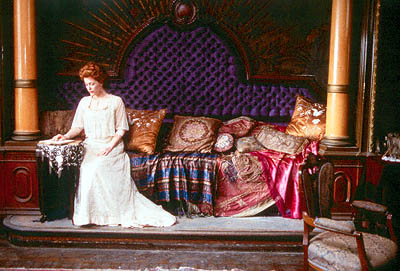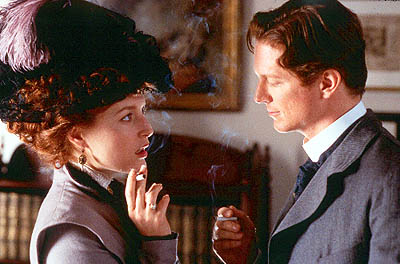

Watching The House of Mirth can feel like window shopping at an expensive jewelry store. It looks amazing, but unless something happens (like going in to buy something) it can get pretty boring. The House of Mirth, based on Edith Wharton's novel, looks fantastic. The set design is lavish, detailed and elegant, and the acting is meticulous. However, the film is immeasurably boring, and at over two hours, sometimes unbearable. There was a person snoring at the screening. Honest.
Gillian Anderson (The X-Files: Fight the Future, Playing By Heart) gives a great performance as Lily Bart, but fans of her television persona as FBI Agent Dana Scully will shudder if they see her here. They are two completely different genres. Here, her role requires an elitist air and a careful choice of words every time she speaks. This is a movie very much for fans of Masterpiece Theater and all of the epic Merchant Ivory films. All of the drama in The House of Mirth lies within the conversations between the characters. The genteel tone of voice masks the icy nature of the words between characters. Bart is part of the social elite in turn of the century New York. They get together for parties, and travel the world in expensive yachts. Bart is looking for a husband, and there are few takers, mainly because of her reputation.
She truly loves Lawrence Seldon (Eric Stolz, The Passion of Ayn Rand, Mr. Jealousy), but quickly turned him away because of social expectations. Bart relies on her aunt Mrs. Peniston (Eleanor Bron, A Little Princess, Black Beauty) for an allowance, but her aunt does not know she owes a large sum of money from gambling. She goes to Gus Trenor (Dan Akroyd, Diamonds, Blues Brothers 2000) for a loan and receives one, but he is looking for an affair in return. Sim Rosedale (Anthonly Lapaglia, Sweet and Lowdown, Summer of Sam) is a willing suitor, but Bart has no desire for him. She is looking for somebody who can match her expectations in social class, but nobody at that station is willing to marry her. When she loses her status as a member of the upper class, it is nearly the same as losing her life. Almost all her friends ignore her, and she must now (gasp!) learn how to earn her money.
Director/adapter Terence Davies (The Neon Bible, The Long Day Closes) makes a film much like another Wharton adaptation, The Age of Innocence. Great to look at, but nearly insufferably long. The fabulous sets and title are deceptive; there is very little happy about the film. The people here use their words as their weapons. If someone in the audience does not pay close attention to the words, they can miss a lot. Its focus on the spoken word almost makes theater a better fit for this adaptation. Anderson's delivery is different from most of the actors. It is much more deliberate and stunted, and avoids contractions. It sounds false, much like everybody's outward appearances. These people are not friends. They just tolerate each other because it is the socially acceptable thing to do. Which is probably what some reaction to this film will be.